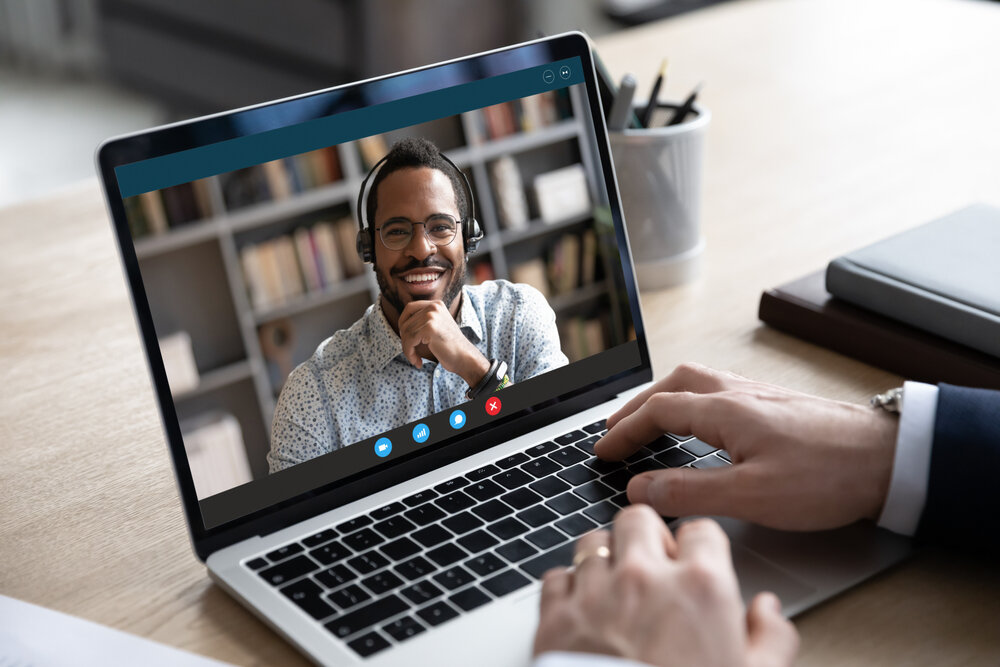How To Hire Remote Employees With A Great Video Interview Strategy

You’ve probably already discovered the benefits of hiring remote workers – that’s why you are now looking to understand how to hire remote employees within a fully remote interview process.
By ensuring you have an excellent remote interview process, your candidate will feel comfortable in the knowledge that you have the right processes, technology, and management in place to support their work – whether they are fully remote or hybrid.
Even if your candidates are looking to work hybrid or office-based, having a standard remote video interview process in place that you can initiate at any point, means that you can put yourself in front of the competition.
We are currently in a candidate-led market. Most sectors are struggling to find the right talent at the right budget. By being able to offer top candidates interviews quickly and conveniently, your job role will be at the front of their minds. Having a remote interview process will put your competitors on the back foot. So, you’d be silly not to read on to discover how to conduct remote interviews.
-
Review your current remote interview process
If you have conducted remote interviews before, think about any issues or challenges you faced. These might be technical or logistical issues. For example, your video interview process includes a task to test technical ability, and you want to ensure the candidate completes it without influence or help from others.
We have many clients who require candidates to complete a technical test as part of their recruitment process. When the pandemic hit, they were able to implement a remote technical interview stage after researching the best solutions to their concerns. With this particular concern, this included things like implementing time limits, asking the candidate to answer similar questions during the next interview stage, or requiring the candidate to stay on video whilst they completed the technical test.
By thinking about the challenges you have come across in the past, you will begin to come up with solutions to implement. There are plenty of hiring managers, recruiters, and HR professionals out there who know how to hire remote employees, so use their experiences and knowledge to your advantage! Search for options on Google, ask your LinkedIn connections, or speak with co-workers who also conduct remote interviews.
-
Choose the right software
When looking to hire a remote employee, before you start the interview process, ensure you have the right software and technology in place. This will minimise any technical issues from arising.
You might want to speak with your IT department or ask current remote workers which option they would suggest.
It’s also helpful to know how many people will be joining these interviews, or whether you or the candidate will need to share their screen, as these elements will impact each video interview software in a different way.
-
Think about your questions
If your candidate is going to be working on a hybrid or fully-remote basis, it’s important to adjust your questions accordingly. Of course, you will need to look for technical capabilities and ask about their work background, but, in general, interview questions for remote workers should have a strong emphasis on soft skills. Working remotely is very different to being based in an office Monday to Friday, so you must ensure your candidate has the ability to be just as, or more productive than an office-based equivalent.
-
Set clear expectations
In the lead up to the interview, communicate with the candidate regarding your expectations for the interview. This includes what video interview tool you’ll be using, the fact you expect the candidate to have their camera turned on, any assessments you will be asking them to complete and anything they’ll need to prepare in advance or attend the interview with (a calculator, pen and paper etc.). You don’t want to leave a candidate scrambling. The aim is to have calm candidates who are ready to answer your questions to the best of their ability.
-
Create and share a tech backup plan
Things go wrong. At the start of the interview, inform the candidate what to do if an issue with the video interview tool occurs, or if either of you experience a bad connection. This might include turning off the video option, or speaking on the phone instead.
-
Choose your location carefully
Make sure your background is neat – think about the impression you’re giving that candidate. If you’re sitting in your messy living room on your sofa, the candidate is not going to feel like they have just attended a professional interview. They might not take your potential job offer seriously.
You should be situated in a quiet location, away from any distracting factors like traffic, dogs, and children. Try not to distract the candidate. You want to facilitate them in performing to the best of their ability.
Unfortunately, you can’t anticipate everything. If something unexpected happens, offer a friendly apology and move on from it swiftly.
-
Proactive listening
Avoid looking down at your notes wherever possible, so that the candidate knows you are paying attention to what they are saying. It can be more difficult to read body language during remote video interviews, so I’d recommend giving the interviewee clear indicators that you are listening through your body language – this might include sitting up straight and nodding. After all, you don’t want them to be answering your question, whilst wondering whether your screen has frozen and you can’t hear their answer.
-
Be aware of your remote interview attire and etiquette
In addition to the normal ways you present yourself during an in-person interview, it’s important you understand how you should conduct yourself in a remote interview setting. This includes checking your microphone/camera in advance of the interview, turning up on time, and ensuring your phone is on silent.
Make sure you leave a second or two between the candidate answering your question and your response. The connection might lag slightly, and you do not want to interrupt a candidate when they are still answering your question.
Remote interview attire should be no different than the clothes you choose to wear when interviewing someone in-person. If you expect your candidate to dress in formal wear, you should make an effort to do the same. I’m certainly not saying to dress in a completely different way to how you would on a normal working day, but it’s important that the candidate recognises that you are taking their interview seriously.
At VIQU, we have supported a large variety of clients who did not understand how to hire remote employees or how to conduct remote interviews when they first started working with us. With our extensive knowledge of what remote workers are looking for during the recruitment and interview process, we can support clients in creating a remote interview process that meets their needs.
If you require support with your video interview process, please get in touch to learn more about our extensive IT recruitment services.
Similar articles you might like...

AI In Software Development: How The Role Of Developers Will Change In The Future
AI in software development is increasing efficiencies and productivity making it the perfect tool to complement a developer's skillset.

Forgoing Using Contract Cloud Migration Specialists: Benefits Vs Drawbacks
Cloud migration specialists are vital professionals but tight budgets are making companies consider alternative ways to deliver projects.
Latest jobs
Full Stack Developer
 Glenrothes, United Kingdom
Glenrothes, United Kingdom
 £40k - 50k per year + Bonus
£40k - 50k per year + Bonus
Full Stack DeveloperSalary: £40,000 - £50,000 per annum plus bonusGlenrothes, Scotland (Full time on site)VIQU have partnered with a leading organisation who are looking to recruit a full stack developer join their development team. The...
Site Supervisor
 Stone, United Kingdom
Stone, United Kingdom
 Market related
Market related
Job Title: Site Supervisor Location: Stone (on-site)- must have full UK Driving License. Salary: market- relatedVIQU has partnered with a top engineering company seeking a Site Supervisor to create and manage project plans. The...
Site Manager - Nuclear Division
 Staffordshire, United Kingdom
Staffordshire, United Kingdom
 Competitive Salary
Competitive Salary
Site Manager - Nuclear Division - Competitive SalaryLocation: StaffordshireVIQU have partnered with a company that has been leading the charge in advanced system integration for decades. The Role:We're looking for an experienced Site Manager with strong...
Telephony Engineer
 Cardiff, United Kingdom
Cardiff, United Kingdom
 £35k - 45k per year
£35k - 45k per year
Telephony Engineer - 12 Month FTC – £35- £45,000 Location: Cardiff (Minimum 3 days on-site) Company: VIQU - Partnered with a Public Sector OrganisationVIQU is working with a Public Sector client to find an experienced...
Solution Architect
 London, United Kingdom
London, United Kingdom
 £650 - 750 per day + Inside IR35
£650 - 750 per day + Inside IR35
Solution Architect – Workplace Modernisation – 12 months ContractA Global Firm are at the start of a Workplace Modernisation programme of work and require a Solutions Architect to join the team and help design this...



